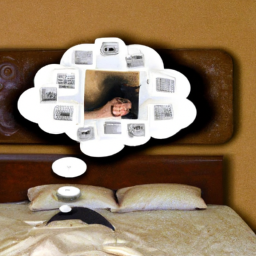Recurring dreams happen because your subconscious uses them as signals, highlighting unresolved issues, fears, or emotions that need your attention. They often serve as a message or “neon sign,” pointing to areas in your life that may still need healing or understanding. When you experience repeated dreams, it’s your mind’s way of processing ongoing stress or significant life changes. Exploring these patterns can offer valuable insights, and the more you pay attention, the clearer the messages become.
Key Takeaways
- Repeating dreams often signal unresolved emotional issues or fears needing attention in waking life.
- They serve as subconscious messages highlighting themes or conflicts that haven’t been fully addressed.
- Stress, anxiety, or major life changes can trigger recurring dreams as your mind processes these experiences.
- Recognizing the symbolism in these dreams can help you understand underlying concerns or insecurities.
- Addressing the root causes through reflection or relaxation techniques may reduce the frequency of these recurring dreams.

Have you ever wondered why you keep having the same dream over and over? It’s a common experience, and understanding it can reveal a lot about your inner world. Repeating dreams often carry strong dream symbolism, which acts as a message from your subconscious. These recurring visions aren’t random; they’re your mind’s way of processing unresolved issues or unspoken emotions. When you notice a pattern of the same dream, it’s like a flashing neon sign pointing to something you need to pay attention to in your waking life. Your subconscious uses these repeated scenarios to emphasize themes or conflicts that haven’t been fully addressed.
Recurring dreams are your subconscious’s way of highlighting unresolved issues and guiding your inner growth.
The reason these dreams keep coming back is largely due to subconscious processing. Your mind continues to work on unresolved problems while you sleep, especially when you haven’t fully dealt with a particular situation or emotion during the day. Think of your subconscious as a diligent worker, using dreams as a tool to sort through and understand your feelings. When a certain issue remains unresolved, your brain keeps revisiting the same dream to try to make sense of it. It’s as if your subconscious is pressing a reset button, hoping that by revisiting the scene, you’ll eventually gain clarity or insight.
Another reason for recurring dreams is that they often symbolize a core concern or fear that you might not be fully aware of. For example, a repetitive dream about losing your keys could symbolize feelings of insecurity or loss of control. Recognizing these themes helps you understand what your subconscious is trying to communicate. The symbolism within these dreams acts as a language that your mind uses to tell you about deeper issues. Once you start paying attention to this dream symbolism, you can begin to interpret what your subconscious is processing and why it keeps returning to the same scenario.
You might also find that recurring dreams appear during periods of stress or major life changes. Your mind clings to familiar patterns as a way to cope with uncertainty. By repeatedly dreaming about the same situation, your subconscious is trying to work through your feelings, even if you’re not consciously aware of it. Over time, as you address the underlying issues, these dreams tend to fade or change. In essence, they are part of your mind’s ongoing effort to process, understand, and eventually resolve complex emotions or conflicts. Recognizing why these dreams happen is the first step toward understanding yourself better and finding peace within your subconscious mind. Additionally, consistent use of relaxation techniques before sleep can sometimes help reduce the frequency of these recurring dreams.
Frequently Asked Questions
Can Recurring Dreams Predict Future Events?
Recurring dreams don’t necessarily predict future events, but they often reflect your subconscious thoughts through dream symbolism. These dreams may highlight unresolved issues or stressors. Since sleep cycles influence how vividly you remember dreams, you might notice patterns that seem predictive. Pay attention to recurring themes, and consider how they relate to your waking life, as understanding these symbols can provide insight into your emotional state.
Do Recurring Dreams Mean I Have Unresolved Issues?
Nearly 60% of people report recurring dreams, suggesting they often point to unresolved issues. These dreams carry rich symbolism, offering insight into your subconscious messages. When you keep experiencing the same dream, it’s usually a sign you haven’t fully addressed certain emotions or conflicts. Pay attention to the dream’s symbols and themes—they often reveal what’s lingering beneath your awareness, urging you to confront and resolve these underlying issues.
How Can I Stop Having the Same Dream?
To stop having the same dream, explore its dream symbolism to understand what it reveals about your emotions or unresolved issues. Practice good sleep hygiene by maintaining a consistent sleep schedule, avoiding screens before bed, and creating a relaxing environment. You can also try journaling your dreams or using relaxation techniques like meditation to reduce anxiety. Over time, these steps can help diminish recurring dreams and improve your sleep quality.
Are Recurring Dreams More Common in Certain Age Groups?
Recurring dreams are like echoes that bounce through your mind, and they’re more common in certain age groups. For example, children often experience childhood nightmares, while adults may face recurring dreams due to stress or unresolved issues. Age-related sleep patterns also influence this, as sleep cycles change over time. So, your age can shape how often these haunting repeats appear, making some periods more prone to them than others.
Do Recurring Dreams Indicate Mental Health Problems?
Recurring dreams can sometimes indicate underlying mental health issues, especially if they involve intense dream symbolism or cause distress. These dreams might reflect unresolved emotions or anxiety. Improving your sleep hygiene—like maintaining a consistent sleep schedule and creating a calming bedtime routine—can reduce their frequency. If they persist or disturb your sleep, consider talking to a mental health professional to explore potential underlying concerns and find effective coping strategies.
Conclusion
Repeating dreams can feel unsettling, but they’re often your mind’s way of processing unresolved emotions or lingering issues. Curiously, studies show that about 60% of people experience recurring dreams at some point, highlighting how common this phenomenon truly is. Understanding why they happen can help you find clarity and even reduce their frequency. So, next time you have the same dream, remember it’s your subconscious trying to tell you something important—listen closely.









